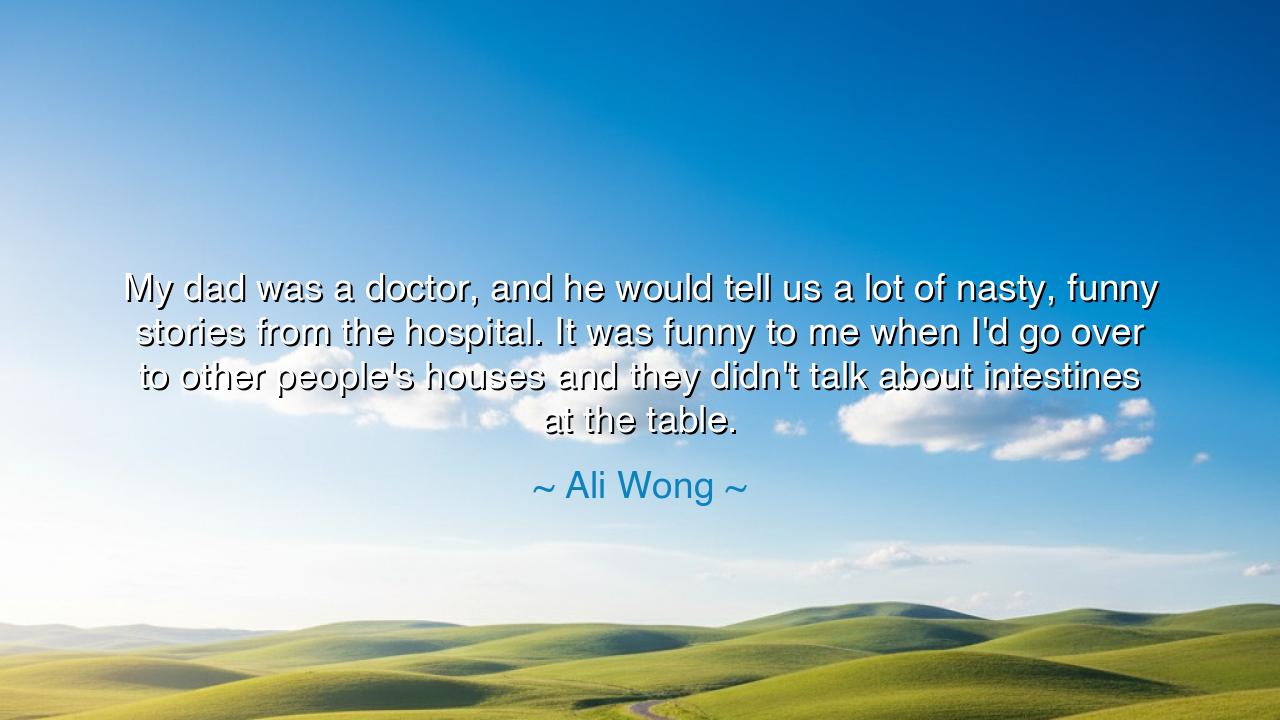
My dad was a doctor, and he would tell us a lot of nasty, funny
My dad was a doctor, and he would tell us a lot of nasty, funny stories from the hospital. It was funny to me when I'd go over to other people's houses and they didn't talk about intestines at the table.






Hearken, O children of the future, and consider the words of Ali Wong, a voice both sharp and tender, declaring: “My dad was a doctor, and he would tell us a lot of nasty, funny stories from the hospital. It was funny to me when I'd go over to other people's houses and they didn't talk about intestines at the table.” At first, these words appear as mere whimsy, a reflection on family quirks, yet beneath them lies a profound meditation on curiosity, upbringing, and the shaping of perspective by the intimate worlds we inhabit. Like rivers carving canyons through rock, the stories told in the hearth of a home sculpt the landscapes of the mind.
Wong’s recollection begins with the family as a crucible of learning. Her father, a physician, shared not merely medical anecdotes but the raw, unfiltered realities of life and death. In this act, he imparted both knowledge and courage, teaching his children to confront what others might shy away from—the visceral truths of the human body. The ancients knew the power of such instruction. Consider Hippocrates, who walked among the sick not with fear but with attentive hands and a curious mind, demonstrating that to understand the world, one must embrace both its beauty and its horror.
The humor Wong recalls is a bridge between the serious and the lighthearted, a recognition that even in the face of discomfort, laughter is a lens through which life becomes more bearable. By hearing tales of intestines and ailments over the family table, she learned early that knowledge need not be solemn to be sacred, that learning can coexist with levity. History abounds with such examples: Leonardo da Vinci, while dissecting human cadavers, approached the task with a mixture of awe and irrepressible curiosity, noting anatomical peculiarities with both precision and humor. It is in such spaces—where the grotesque meets the playful—that the mind sharpens and the spirit learns resilience.
Yet, this quote also reveals a lesson in perspective and cultural norms. Wong found it amusing that other households avoided such frank discussions, a subtle recognition that our upbringing shapes our thresholds for what is ordinary or shocking. Socrates, too, encouraged discourse on topics that made many uneasy, believing that the cultivation of wisdom required confronting what others would dismiss. To grow, one must recognize that the familiar lens of our early experiences may clash with societal expectations, and yet these differences are fertile ground for insight and humor.
The stories of Wong’s father were more than entertainment—they were preparation for the world, an education in empathy and observation. When one hears the messy, intricate details of life from an early age, one develops a sturdier understanding of human nature, of suffering and resilience, of the humor that can emerge even in the darkest moments. Florence Nightingale, tending the wounded in the Crimean War, understood this intimacy with suffering and responded not with despair but with a meticulous care that transformed nursing forever. Knowledge of the unvarnished truth, tempered with compassion and humor, empowers extraordinary action.
In observing others’ reticence around such topics, Wong learns the value of openness. A mind unafraid to confront the ordinary and the grotesque alike is one equipped to engage fully with life. To speak candidly of what is often taboo is not vulgarity—it is a claim of authenticity. In ancient times, philosophers gathered in agoras to discuss matters both lofty and mundane, recognizing that wisdom grows where curiosity is unshackled. Wong’s laughter at the contrast between her family and others embodies the timeless lesson that curiosity and openness cultivate discernment and courage.
From this reflection emerges a practical teaching: embrace the unusual, the messy, and the humorous aspects of life, for they sharpen understanding and fortify character. Listen to stories that challenge your comfort, speak openly about the truths others might avoid, and approach both learning and daily life with a mixture of awe and levity. Just as Ali Wong’s father shared tales of the hospital, you too can transform the ordinary into lessons of wisdom and resilience.
Thus, let it be known that the home, with its peculiar stories and candid conversations, is a forge of the mind. Honor the humor in life’s unseemly truths, cultivate curiosity unafraid of discomfort, and treasure the perspective given by those who dare to speak plainly. For in the melding of the grotesque, the funny, and the profound, the human spirit grows strong, insightful, and ever prepared for the world beyond the table.






AAdministratorAdministrator
Welcome, honored guests. Please leave a comment, we will respond soon